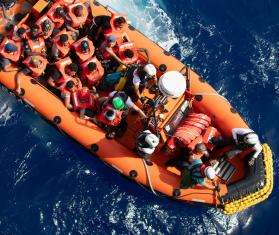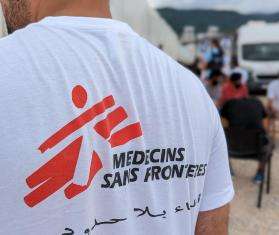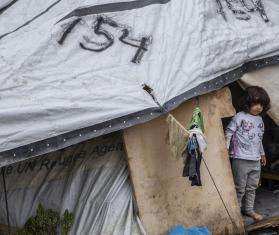The migration route across the Mediterranean Sea from the Libyan coast to Europe is the most traveled in the world. It is also the most dangerous.
People attempting the sea journey face extortion, torture, arbitrary detention, and sexual violence on their way to the Libyan coast; at sea, their lives are at the mercy of unsteady, unequipped boats that frequently capsize and sink.*
Despite the grave dangers, thousands of people attempt this journey each year, forced from home by violence, persecution, and other crises. The Doctors Without Borders/Médecins Sans Frontières (MSF) search and rescue ship Geo Barents helps people in distress on the Central Mediterranean. As we prepare to mark World Refugee Day on June 20, 2023, we’re sharing stories from people rescued by the Geo Barents who undertook the treacherous journey through Libya to the Mediterranean in hopes of reaching safety in Europe.
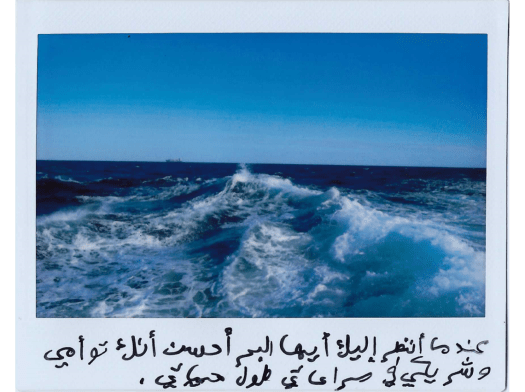
Mediterranean Sea 2023 © Nyancho NwaNri
I feel like you are my twin and partner
in all the struggles of my life."
Embarking on the long road to Libya
“I was prepared to take this risk because my heart was so heavy with what I had experienced in Syria. I am very young, and I do not want to carry the burden of war for the rest of my life. I do not deserve that. I said to myself: ‘Be patient and be strong.’”— Maysan, Syria
“When I was 14, I decided to leave Cameroon and look for a better future somewhere else [...] I passed through Nigeria, Niger, and then I arrived in Libya. The journey was very hard. The smuggler put all of us in the back of a pick-up truck. We did not even have space to move our legs.” — Zoule, Cameroon
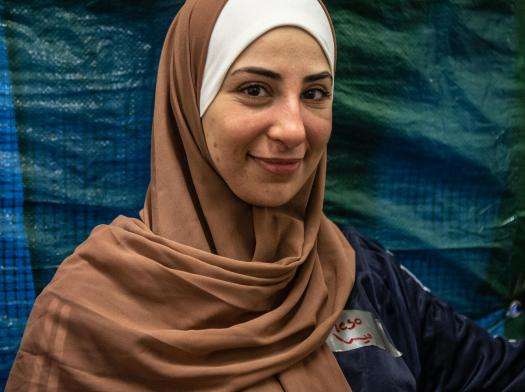
Mediterranean Sea 2022 © Anna Pantelia/MSF
“We crossed the desert during summertime. I remember the sun was [on] my skin. The driver had to hide us because the police was were patrolling. It was very scary.” — Rebecca, Ghana
“I managed to get to Nigeria with the little money I had. When I arrived, I was sleeping under trucks and buses as I did not have any money. I had a necklace and a mobile phone, which I sold to get some money and continue my journey.” — Janice, Cameroon
“In this journey, some can fly, some can run, some can walk and some can crawl in order to achieve their goal. The most important thing is not to give up. Unfortunately, I could not ‘fly’ and I had to spend years working before I was able to collect the amount I needed in order to cross the sea. There were times that I was thinking of giving up but then I could not go back, I could not just fail.” — Boubacar, Senegal
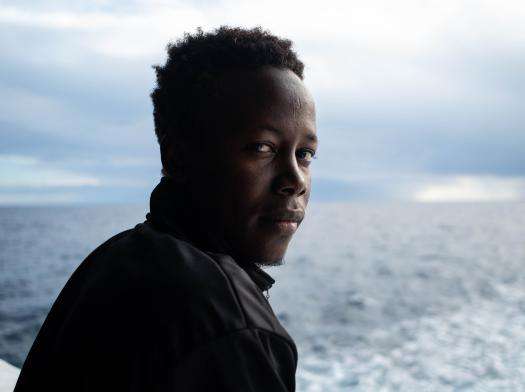
Mediterranean Sea 2023 © Nyancho NwaNri/MSF
A woman’s journey
“[The driver] dropped me near the border and told me he would come back, but he never came back. I waited there for hours until two men in another car offered to take me to Niger. I told them that I did not have any way to pay them, and they said that if I had sex with them, they could take me without money. I had no other choice.” — Janice, Cameroon
“We first arrived at Saba and there I managed to buy a SIM card and call my husband. We then continued to Tripoli with another driver. Both drivers asked for sex. […] I told the other passengers and stayed with them. They protected me. The minute I was alone, they would have raped me. There was one other woman with me and we stayed together. Thanks god, nothing happened to us. We always [sat] at the back of the vehicle. It was the least comfortable place but the safer one, far away from the drivers. In total, it took me three weeks [to travel from] Ghana to Tripoli.” — Rebecca, Ghana
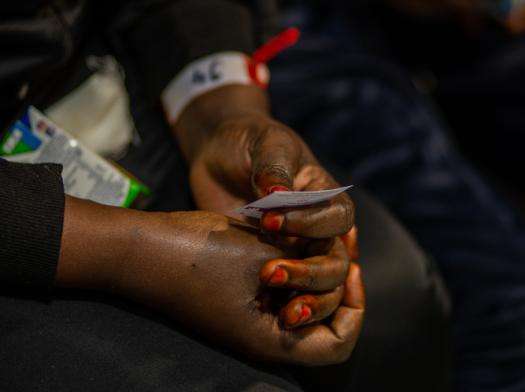
A woman holds a leaflet of contact numbers for protection services in Europe during an aMSF wareness session on sexual violence.
Mediterranean Sea 2022 © Mahka Eslami/MSF
“As a black woman you cannot do anything in Libya. You live in constant fear. You cannot walk anywhere during the day because someone will kidnap you, torture you, rape you and forced you into prostitution.” — Tino, Nigeria
“We first arrived at Saba and there I managed to buy a SIM card and call my husband. We then continued to Tripoli with another driver. Both drivers asked for sex. […] I told the other passengers and stayed with them. They protected me. The minute I was alone, they would have raped me. There was one other woman with me and we stayed together. Thanks god, nothing happened to us. We always [sat] at the back of the vehicle. It was the least comfortable place but the safer one, far away from the drivers. In total, it took me three weeks [to travel from] Ghana to Tripoli.” — Rebecca, Ghana
Conditions of arbitrary detention
“I spent seven months [in detention] and then I was sold to another place. We were 1000 persons in this place, which was like a prison. They gave us dry bread for food once a day for lunch and we were drinking some water spread on the floor. We could not take any shower. It was also impossible to leave this horrible place. If you try to escape, they simply shoot you.” — Jean, Cameroon
“If you have money, [the guards] may sell you a pack of toast bread for 5 Libyan dinars (1$). The water we drank was always dirty and [there was never] enough for everyone, so often we had to drink the water from the toilet.” — Abdoulie, Gambia
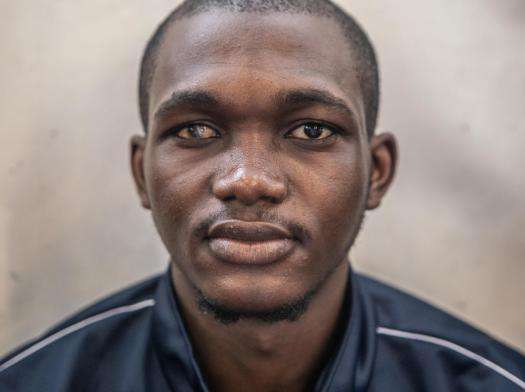
Mediterranean Sea 2022 © Anna Pantelia/MSF
“One of the people I was friends with in the jail got beaten to death. Before they give you food they beat you very seriously. This man was from Ivory Coast and he could not afford to pay [the guards]. He was beaten [so] much that he lost almost all his teeth. His belly was swollen after the beating and he was vomiting everything he was eating. I was trying to smash some boiled potatoes and feed him, but he was just vomiting it. His legs were completely broken and he couldn’t even go to the toilet so he had to do everything in the place he was sleeping. One day he just died. I was there when he died.” — Abdoulie, Gambia
“I lost sight in one eye after they beat me with a metal stick. The stick injured my eye so badly that now I can’t see with it. They didn’t even take me to the hospital when this happened.” — Zoule, Cameroon
“Everyone is undocumented there because when we enter the jail, they take all our documents and rip them. So when someone dies, they just throw their body in the desert.” — Abdoulie, Gambia
Paying for your life through extortion
“After entering Libya, we were taken to Sabaa prison. I spent eight months there. They beat us very badly until we paid them. If we did not have any money, they called our families and demanded money from them to release us. They made our families listen on the phone while they beat us. Sometimes they even took videos of us being abused and sent them to our families. But I had no money and no family, so I spent eight months locked up and beaten.” — Zoule, Cameroon
“There was no way I would call back home and ask for money from my family. I was the one meant to help them, not the opposite [...] At some point, they understood that there was no way for me to find money to pay them, so they let me out after they beat me up severely." — Boubacar, Senegal
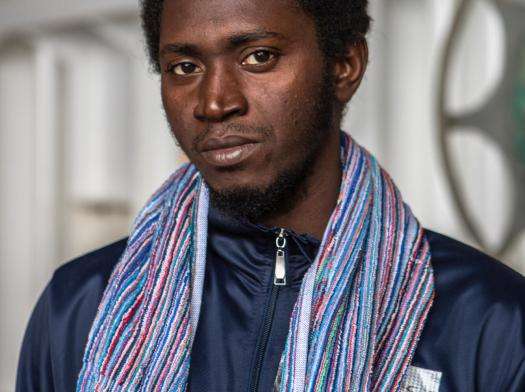
“In these jails, either you pay or you die." — Abdoulie, Gambia
Mediterranean Sea 2022 © Anna Pantelia/MSF
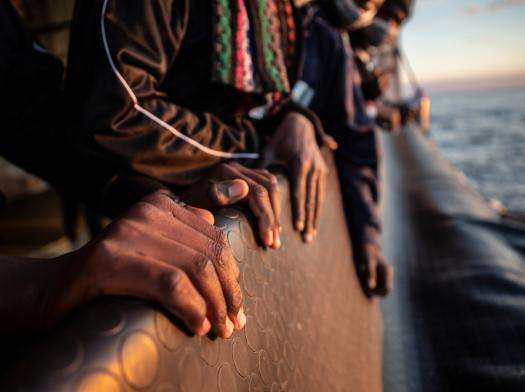
“They were frightening us to call our families and ask for money [...] But who was I supposed to call? I lost my family and I do not have any phone numbers in mind.” — Jean, Cameroon
Mediterranean Sea 2022 © Anna Pantelia/MSF
“In these jails, either you pay or you die. They torture you until you pay them […] I saw people getting tortured and electrocuted. Sometimes if they understand that you will never pay, they just break your arms and legs and they leave you somewhere in the city alone. If you try to escape, they just shoot you.” — Abdoulie, Gambia
“They beat us but they [were] keeping us alive so they could extort money from us.” — Sarah, Ethiopia
“When we arrived, they locked me in a house with other people from different nationalities. They were frightening us to call our families and ask for money. Many people could pay and managed to leave. But who was I supposed to call? I lost my family and I do not have any phone numbers in mind.” — Jean, Cameroon
Intercepted and sent back to port
“When we were in the sea the Libyan coastguard stopped us after two hours. They took us to Sama prison and then sold all of us to Sufada prison which is run by terrorists. There they forced men to go and work in constructions every day and they would keep our salaries and raped the women.” — John, Nigeria
“When I was seven months pregnant, I tried to cross the sea. Many people were put in two boats. One boat left but our boat was stopped by the Libyan police on the beach, before we had gone to sea. Some days later we learned that the first boat was wrecked, and everyone drowned. [...] When I tried to cross the sea for the second time, I had decided that I would be better off at the bottom of the sea than back in Libya.”— Janice, Cameroon
“The first time I tried to cross the sea, the Libyan coastguard stopped us. They tried to block our boat from sailing and then they shot in the air to scare us. Finally, they took us back to Libya and straight to prison.” — Zoule, Cameroon
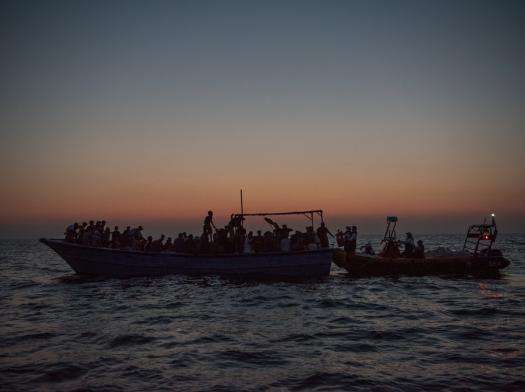
Mediterranean Sea 2021 © Vincent Haiges/MSF
“After one week, I tried to cross the sea but we were intercepted by the Libyan police and I spent two months in prison. They took my phone and my passport and they asked me for 1,000 dollars to get free. Everything in Libya is about money. “— Alaa, Syria
“We were stopped by the Libyan coastguard. They started to insult us, calling us donkeys and they asked us to move to their boat. We had to follow their commands because we knew that if we did not, they would shoot us. They shot on other boats in the past.” — Abdoulie, Gambia
"There was a Moroccan woman with a baby.When she passed her baby to the coast guards, the baby fell in the water. She tried to jump in the water to get him but they stopped her. The baby disappeared in the water.” — Hassan, Syria
Stranded at sea
“The night the smuggler decided to send us to the boat, it was very windy with rough sea. Many people refused to get onto the boat [...] but I decided to go. After 15 minutes, the boat capsized and we were all in the water.” — Hassan, Syria
"When I was in the boat the third time and it started getting filled with water I thought I would die. I fell into the water. We had no life jackets because the smuggler was charging us 200 Libyan Dinars ($42). So at some point I said to God to forgive me for anything bad I might have done.” — John, Nigeria
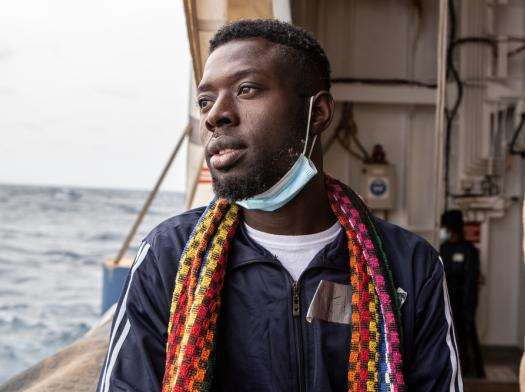
Mediterranean Sea 2023 © Anna Pantelia/MSF
"We spent five days in the sea without fuel before you saved us. We only had one cookie and a bit of water each when we left. My body was itching a lot. Our boat was overcrowded and not strong. The front was also broken. We did not have the choice, the smuggler put us in. After few miles, the water was already coming in. We called Libya but no one came. A boat also passed us but did not stop." — Kidane, Eritrea
"I was not afraid to die. I prefer to die in the sea than go back to Gambia empty-handed." — Abdoulie, Gambia
“I feel bad because the woman who smuggled us had asked us to tell other Syrian people intending to travel with us that the journey would be very safe and that they should trust her. In the end we all found ourselves in this terrible boat in the middle of nowhere. I apologized and asked them to forgive me.” — Maysan, Syria

Mediterranean Sea 2022 © Rahul Dhankani/MSF
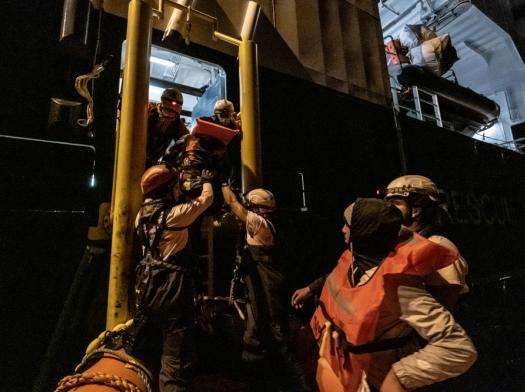
Mediterranean Sea 2023 © Nyancho NwaNri/MSF
Rescue on the horizon
“As time passed, I lost any hope I still had. Then the rescuers from MSF came. When they arrived, I was almost unconscious. I was so weak because of the journey that I could barely understand what was happening. I was convinced I was about to die. Thanks be to God, they rescued us.” — Maysan, Syria
“We were so lucky that MSF came to rescue us. I remember that it was a Sudanese guy from our boat who actually dragged me out of the water.” — John, Nigeria
“I woke up with people around me saying ‘Lampedusa’ [an island off the coast of Italy]. They [passengers] got very excited when they saw the Geo Barents. I could not see anything from afar but I saw the two small boats approaching. They gave us life jackets. I was so happy. My husband told me three weeks ago that he had a dream. He told me I would be rescued by the Geo Barents and here I am.” — Rebecca, Ghana
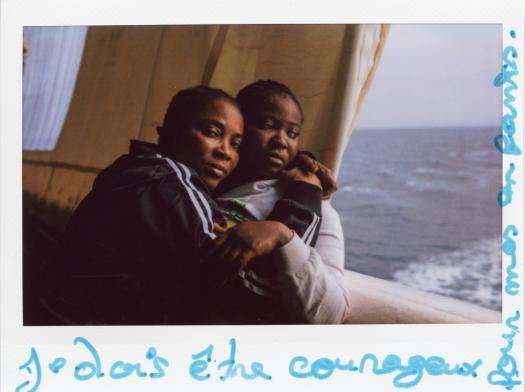
Mediterranean Sea 2022 © Mahka Eslami/MSF
Hope for a better future
“I would like my children to grow up to be somebody. When I was a child, I experienced a lot of bad things. My mother was blind. She had 15 children but only three survived. I was the only girl. I was married by force. I did not go to school. I want to send my children to school. I do not want my children to be married by force like I was. I don’t want my girls to have a life like mine.” — Bintou, Ivory Coast
“I want to build my mum a big house and help her more… I miss my mother so much. I love my mother so much and my mother loves me. All I want is to see her again, God willing.” — Haidar, Nigeria
“The only thing I want is to have a bed for my children, clean clothes and good food. This is when I will feel good and proud of myself again. We supported each other so much during the journey and he never let me down. So now my biggest hope is that my husband will cross the sea alive.” — Sadia, Burkina Faso
“I have been thinking about the day that I will be in Europe since I was 19 years old. Back then I was only thinking about my dream to continue my education but now my main goal is to be able to see my parents again before they die. We spent seven years apart and they told me themselves that they do not care whether I have money or not, t. They want to see me before they die and I want to make them feel proud about their son.” — Abdoulie, Gambia
“My dream is to help people like me, who fled their countries because of war and who are trying to join their families. I would like to see Europe too, Rome, Paris and the mountains in Switzerland.” — Alaa, Syria
“Please, share what happened to me. I do not want anyone to suffer like I did.” — Jean, Cameroon

EU and Greece must take accountability after deadly shipwreck
Read moreDuring the early morning hours of June 14, a fishing boat carrying hundreds of migrants and asylum seekers capsized off the coast of Greece. So far 78 bodies have been retrieved, while hundreds of people remain missing and are feared dead. One hundred and four people have been rescued. On the morning of June 16, 70 of these shipwreck survivors were transferred from the port of Kalamata to the Malakasa reception and identification center, outside Athens, where MSF teams were able to secure access to provide urgent medical and psychological assistance.
This was one of the worst tragedies in the Mediterranean in several years, however there have been too many others. This year alone, 1,289 people have been reported dead or missing on the Mediterranean Sea route, according to the International Organization for Migration. For years MSF has been calling on European states to ensure safe passage for people in need of protection, including by fulfilling their obligations to conduct rescues at sea.

